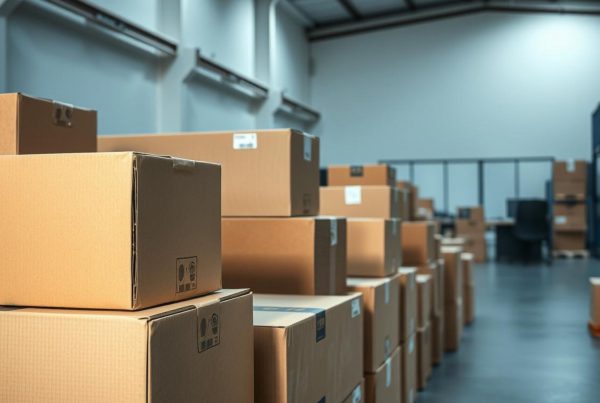Shipping large items can be a daunting task for any business. From figuring out the right box size to understanding carrier restrictions, there are many factors to consider. But don’t worry; this guide will walk you through everything you need to know about shipping large boxes and ensuring your items arrive safely and cost-effectively.
Understanding Shipping Box Sizes
When we talk about large shipping boxes, we’re referring to boxes that can handle big, bulky items without compromising the safety of the contents. Using the right size box is crucial not only for protecting your items but also for optimizing shipping costs.
Imagine you need to ship a collection of long, narrow items. A long box or long boxes for shipping would be ideal. These are specifically designed to handle items that are lengthy but not necessarily wide.
Maximum Dimensions for Shipping Boxes
The maximum dimensions for shipping boxes depend on the carrier you choose. Here’s a quick overview of what some of the major carriers allow:
- UPS: Maximum length + girth is 165 inches, with a maximum length of 108 inches.
- FedEx: Maximum length + girth is 165 inches, with a maximum length of 119 inches.
- USPS: Maximum length + girth is 108 inches for most services, with certain services allowing up to 130 inches.
Examples of Specific Sizes
- 28 inch box and 36 cardboard box are common dimensions that fall well within most carriers’ size limits.
- These sizes are ideal for items that are large but not excessively heavy, ensuring they can be shipped without incurring additional charges for oversized packages.
Factors Affecting Maximum Shipping Box Size
Several factors determine the maximum box size you can use for shipping:
Carrier Regulations
Each carrier has specific size and weight limits. Exceeding these limits can result in extra fees or even refusal to ship the package.
Weight Limits
Heavy items require sturdy boxes that can support the weight without breaking. Always check the weight capacity of the box before shipping.
Dimensional Weight
Carriers often use dimensional weight pricing, which calculates shipping costs based on the volume of the box rather than its actual weight. This means that larger boxes can incur higher shipping fees, even if they are not heavy.
Packaging Material
The type of packaging material you use can also impact the allowable box size. For instance, using thick padding might require a larger box to accommodate the item and the cushioning.
Finding Large Shipping Boxes
Finding the right large shipping boxes near me can be a challenge, especially if you need them quickly. Fortunately, many online retailers offer a wide selection of large shipping boxes that can be delivered to your doorstep.
Tips for Sourcing Big Boxes
- Local Retailers: Check hardware stores or office supply shops for large boxes.
- Online Suppliers: Websites like The Boxery offer a variety of large shipping boxes that can be ordered in bulk.
- Custom Boxes: If standard sizes don’t meet your needs, consider ordering custom boxes designed to fit your specific items.
Shipping Large Items
Shipping large items requires careful planning and preparation. Here are some best practices to follow:
Packaging Tips
- Use Quality Boxes: Ensure the box is sturdy enough to handle the weight and size of your item. Big boxes are specifically designed for heavy-duty shipping.
- Proper Padding: Use bubble wrap, foam peanuts, or other cushioning materials to protect the item.
- Secure Sealing: Seal all seams with strong packing tape to prevent the box from opening during transit.
Optimizing Space
Efficiently packing your items can help reduce shipping costs. Try to minimize empty space in the box, as this can lead to higher dimensional weight charges.
Cost Considerations
Shipping large boxes can be expensive, but understanding how costs are calculated can help you save money. Here are some key points to consider:
Dimensional Weight Pricing
This pricing method is used by most carriers and can significantly impact the cost of shipping large items. To avoid unexpected charges, calculate the dimensional weight of your package before shipping.
Reducing Shipping Costs
- Choose the Right Box Size: Use the smallest box that can safely hold your item.
- Negotiate Rates: If you ship large volumes, negotiate better rates with your carrier.
- Use Flat-Rate Boxes: Some carriers offer flat-rate boxes for specific sizes, which can be more cost-effective for heavy items.
About The Company
If you’re in need of reliable, high-quality shipping boxes, look no further than The Boxery. With a wide selection of large shipping boxes, long boxes for shipping, and other packaging supplies, The Boxery has everything you need to ensure your items are shipped safely and efficiently. Whether you’re looking for a 28 inch box, a 36 cardboard box, or custom solutions, The Boxery offers competitive prices and exceptional customer service to meet all your shipping needs.
Conclusion
Understanding the biggest box size that can be shipped is crucial for businesses looking to improve their shipping processes. By selecting the right box size and following best practices for packaging and shipping, you can reduce costs, protect your items, and ensure timely delivery. Whether you need large shipping boxes near you or custom solutions, resources like The Boxery can provide the products and support you need to optimize your shipping strategy.





Recent Comments